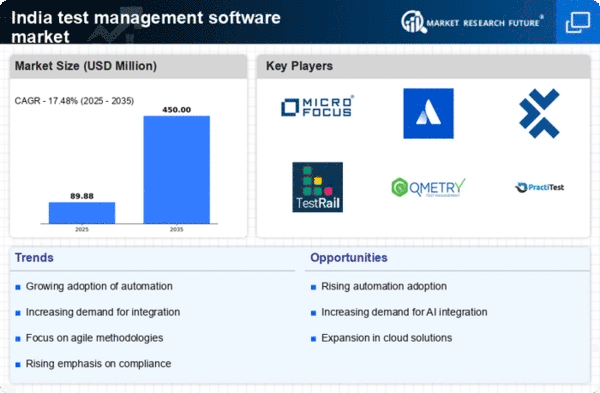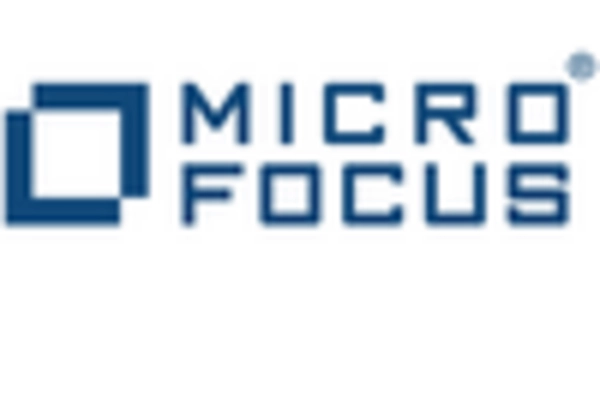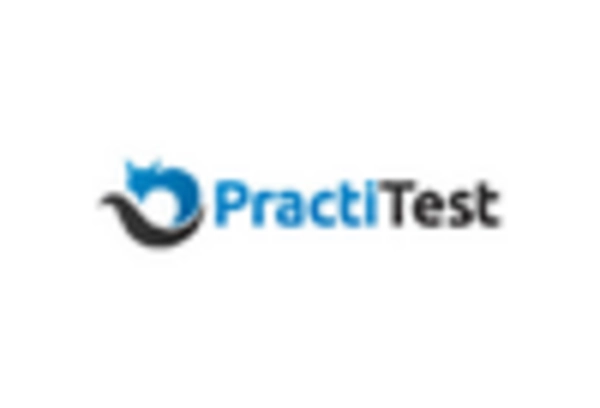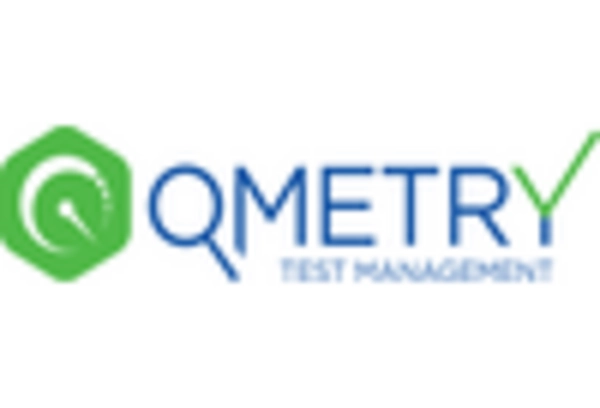Growing Focus on User Experience
the growing focus on user experience (UX) is reshaping the test management software market in India. As businesses strive to create intuitive and user-friendly applications, the role of testing in enhancing UX has become increasingly vital. Organizations are investing in test management tools that facilitate usability testing, performance testing, and user feedback integration. This trend is indicative of a broader shift towards customer-centric software development practices. In 2025, it is anticipated that nearly 70% of Indian software development teams will prioritize UX testing as part of their overall testing strategy. This focus on user experience not only improves customer satisfaction but also drives brand loyalty, making it a key consideration for companies in the test management-software market.
Emphasis on Regulatory Compliance
Regulatory compliance is becoming a critical driver for the test management-software market in India. With the increasing number of regulations governing data protection, software quality, and industry standards, organizations are compelled to adopt comprehensive testing solutions that ensure compliance. The need for test management tools that can facilitate adherence to these regulations is evident, as non-compliance can lead to significant financial penalties and reputational damage. In 2025, it is projected that compliance-related testing will account for approximately 25% of the overall testing budget in Indian enterprises. This emphasis on regulatory compliance is likely to propel the demand for sophisticated test management software that can automate compliance checks and provide detailed reporting.
Rising Demand for Quality Assurance
the test management software market in India is experiencing a notable surge in demand for quality assurance solutions. As organizations increasingly recognize the importance of delivering high-quality software products, the need for robust testing processes becomes paramount. This trend is reflected in the growing investment in test management tools, which are essential for ensuring that software meets user expectations and regulatory standards. In 2025, the Indian software testing market is projected to reach approximately $2.5 billion, indicating a compound annual growth rate (CAGR) of around 15%. This growth is likely driven by the need for comprehensive testing strategies that can adapt to evolving technologies and methodologies, thereby enhancing the overall quality of software products in the market.
Shift Towards Cloud-Based Solutions
the shift towards cloud-based solutions is significantly influencing the test management software market in India. Organizations are increasingly adopting cloud technologies to enhance flexibility, scalability, and cost-effectiveness in their testing processes. Cloud-based test management tools allow teams to collaborate seamlessly, access testing resources from anywhere, and reduce infrastructure costs. In 2025, it is estimated that over 60% of Indian enterprises will utilize cloud-based testing solutions, reflecting a growing preference for Software as a Service (SaaS) models. This transition not only streamlines testing workflows but also enables organizations to respond more rapidly to market demands, thereby fostering innovation and improving time-to-market for software products.
Integration of Artificial Intelligence
the integration of artificial intelligence (AI) technologies is emerging as a transformative driver for the test management software market in India. AI-powered testing tools are capable of automating repetitive tasks, enhancing test accuracy, and providing predictive analytics for better decision-making. This technological advancement is likely to streamline testing processes and reduce time-to-market for software products. In 2025, it is estimated that AI-driven testing solutions will account for approximately 30% of the total testing tools used in Indian enterprises. The adoption of AI in test management not only improves efficiency but also enables organizations to focus on more complex testing scenarios, thereby enhancing the overall quality of software in the market.
















